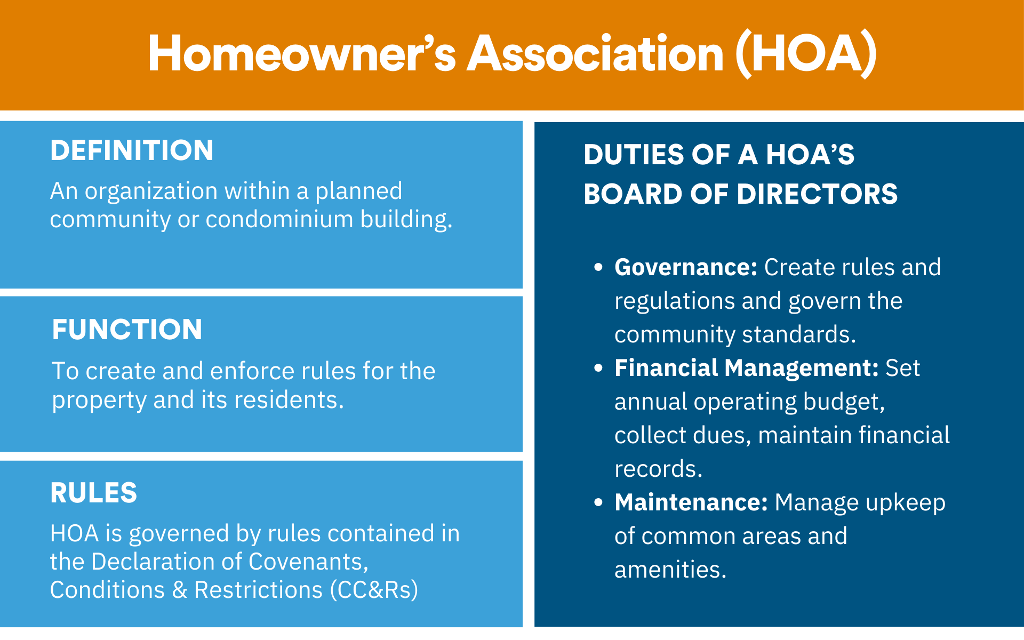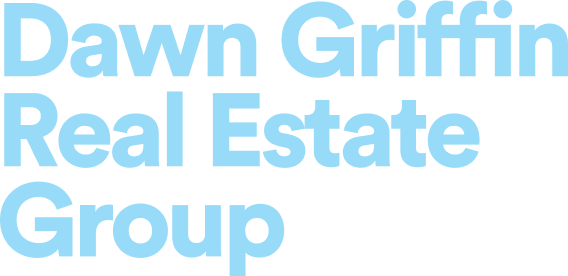Understanding Home Owners Associations (HOAs)
When searching for a new home, you’ll likely encounter properties managed by a homeowners association (HOA). It is estimated over 40 million homes nationwide are governed by HOAs. HOAs play a crucial role in maintaining the aesthetics and harmony of a community, but they can also impose rules that might seem restrictive. Before purchasing a home in an HOA-managed community, take time to thoroughly review the governing documents, including the Covenants, Conditions, and Restrictions (CC&Rs). These documents outline the rules and guidelines for the community, covering everything from landscaping requirements to parking regulations. Understanding these rules upfront will help you avoid any surprises and ensure that you’re prepared to comply with them.
Reviewing HOA Governing Documents
Covenants, Conditions, and Restrictions (CC&Rs)
- Property Use Restrictions: Rules on what you can and cannot do with your property (e.g., exterior paint colors, fencing, landscaping).
- Home Maintenance Requirements: Standards for property upkeep, including lawn care and exterior appearance.
- Rules on Renting: Restrictions on leasing your property, such as minimum lease periods or caps on the number of rental properties.
- Pet Policies: Regulations concerning pet ownership, including breed restrictions, limits on the number of pets, and leash rules.
HOA Fees
- Monthly/Annual Dues: Amount and frequency of regular dues.
- Special Assessments: Potential for one-time fees for unexpected repairs or improvements.
- Increases in Fees: History of fee increases and guidelines for future changes.
Common Area Maintenance
- Maintenance Responsibilities: What the HOA is responsible for maintaining versus what is the homeowner’s responsibility.
- Amenities: Details on community amenities (e.g., pools, parks, gyms) and any associated usage fees.
- Reserve Fund: Information on the reserve fund’s size and purpose (e.g., long-term maintenance of common areas).
Board Structure and Governance
- Board Composition: How the HOA board is structured, including the number of members and their roles.
- Elections and Voting Rights: Process for electing board members and voting on community matters.
- Meeting Frequency: How often the board meets and the frequency of general HOA meetings.
- Dispute Resolution Process: Procedures for resolving conflicts between homeowners and the HOA.
Architectural Guidelines
- Approval Process: Steps required to get approval for renovations, additions, or exterior changes to your property.
- Design Standards: Specific guidelines on materials, colors, and architectural styles allowed in the community.
Enforcement Policies
- Violation Penalties: Fines or penalties for non-compliance with HOA rules.
- Lien and Foreclosure Policies: Circumstances under which the HOA can place a lien on your property or initiate foreclosure.
Insurance Requirements
- HOA Insurance Coverage: Details on what is covered by the HOA’s insurance (e.g., common areas, liability).
- Homeowner Insurance Requirements: Any specific insurance requirements for homeowners.
Financial Health of the HOA
- Budget Reports: Review the HOA’s annual budget and financial statements to assess its financial stability.
- Audit Reports: Any recent audit reports that provide insight into the HOA’s financial practices.
Rules for Community Living
- Noise Regulations: Policies on noise levels and quiet hours.
- Parking Restrictions: Rules about parking in the community, including guest parking and vehicle types.
- Trash and Recycling: Guidelines for waste disposal, including designated collection days and container storage.
Community Restrictions
- Short-Term Rentals: Policies on short-term rentals like Airbnb.
- Age Restrictions: If the community is age-restricted (e.g., 55+ communities).
- Commercial Activity: Restrictions on running a business from your home

Tips for a Harmonious Relationship with Your HOA
1. Attend Meetings
HOA meetings are where decisions about the community are made, and attending these meetings is an excellent way to stay informed and involved. Whether the meetings are held monthly, quarterly, or annually, your presence shows that you’re invested in the community. It’s also an opportunity to voice your opinions, ask questions, and influence decisions that affect your neighborhood.
2. Communicate Effectively
Open and respectful communication is key to a successful relationship with your HOA. If you have concerns or need clarification on a rule, reach out to the HOA board or management company. When addressing issues, remain polite and constructive, focusing on finding solutions rather than pointing fingers. Building a positive rapport with board members can go a long way in resolving conflicts.
3. Get Involved
Volunteering for a committee or even serving on the HOA board can give you a better understanding of how the association operates and allow you to contribute to your community. Whether it’s organizing events, overseeing maintenance projects, or helping with communications, your involvement can make a significant difference and help you build relationships with your neighbors.
4. Follow the Rules
This may seem obvious, but it’s crucial to adhere to the HOA’s rules and regulations. Non-compliance can result in fines, legal action, or even a lien on your property. If you find a rule particularly burdensome or outdated, consider proposing a change through the proper channels, but always follow the current rules while the process unfolds.
5. Pay Dues on Time
HOA dues are necessary for maintaining the common areas and amenities in your community. Always pay your dues on time to avoid late fees and penalties. If you’re experiencing financial difficulties, communicate with the HOA as soon as possible to discuss potential payment plans or other arrangements.
6. Resolve Disputes Amicably
Disagreements with your HOA or neighbors can arise, but it’s important to handle them calmly and professionally. Try to resolve issues directly with the involved parties before escalating the matter to the HOA board. If a resolution isn’t possible, consider mediation as an alternative to litigation. Keeping disputes civil helps maintain a peaceful community atmosphere.
7. Know Your Rights
While HOAs have the authority to enforce community rules, homeowners also have rights. Familiarize yourself with state and local laws governing HOAs, as these can vary significantly. If you believe your HOA is overstepping its authority or acting unfairly, consult with a legal professional to understand your options.
8. Respect Your Neighbors
A harmonious community is built on mutual respect. Be considerate of your neighbors by keeping noise levels down, maintaining your property, and following community guidelines. Small gestures, like saying hello or lending a hand, can foster a sense of camaraderie and make your neighborhood a more pleasant place to live.
9. Stay Informed
HOAs often update their rules or make changes to community policies. Make sure to stay informed by reading newsletters, emails, or any other communication from the HOA. Staying up-to-date ensures you won’t be caught off guard by new regulations or changes that affect your home.
Conclusion
Navigating the details of a HOA’s Covenants, Conditions, and Restrictions (CC&Rs) may seem daunting, but understanding these guidelines is key to making an informed decision and ultimately in maintaining harmony within a community governed by an HOA. By familiarizing yourself with the rules and proactively communicating with your HOA, you can enjoy the benefits of a well-maintained neighborhood while avoiding unnecessary conflicts. Remember, your HOA is there to protect the value of your property and enhance your community’s living environment. If you have any questions or concerns about HOAs, our real estate team is here to help. With our expertise, we can guide you through the nuances of your HOA’s regulations and ensure you make informed decisions for a thriving, vibrant neighborhood.



